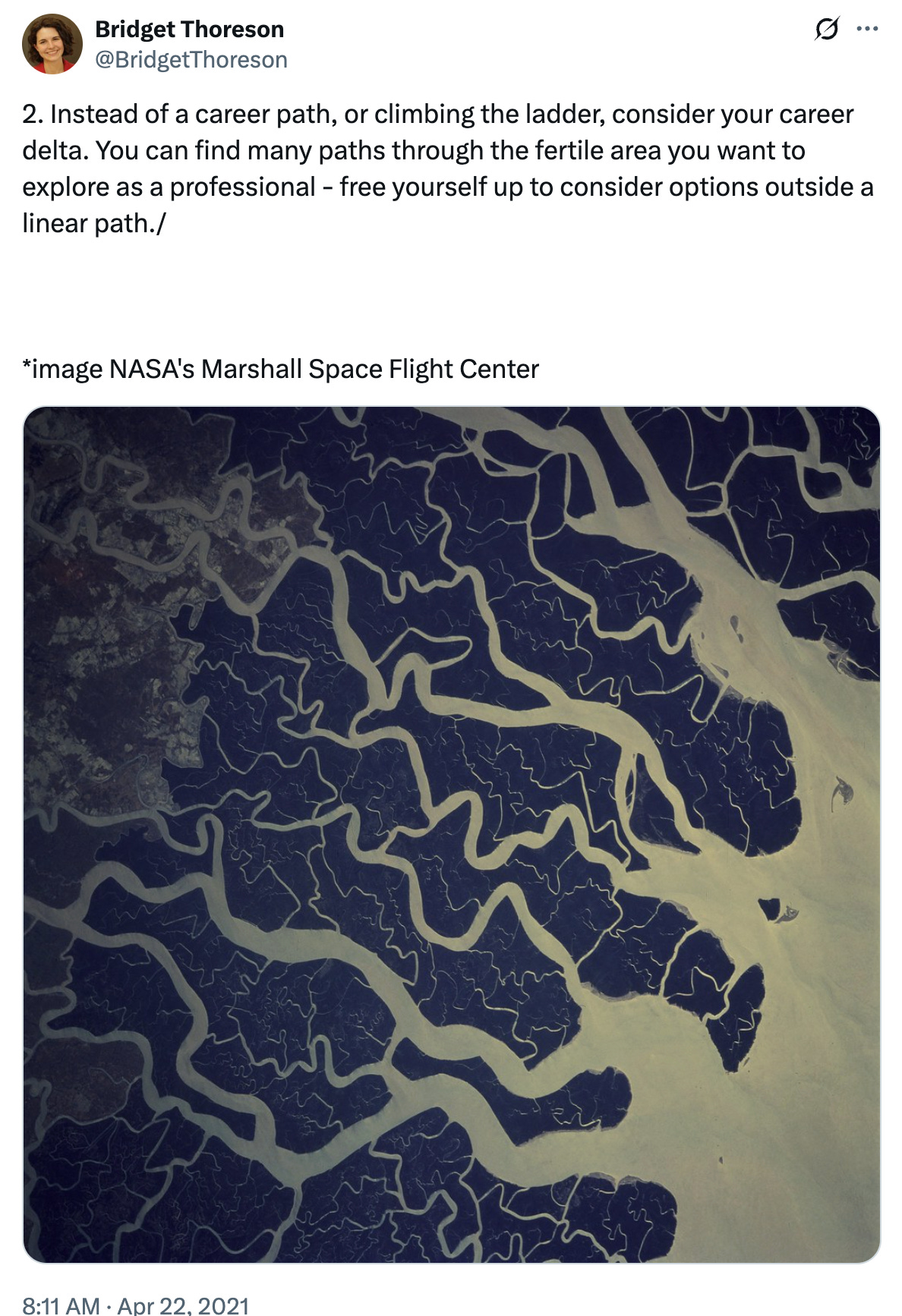‘Making the decision right’
Perfection paralysis? Find your river delta and explore
I’ve now held 95 one-on-one Career River chats, and one of the major themes I’ve been hearing relates all the way back to some advice that kicked off this project in the first place.
People keep telling me they’re uncertain what the “right” next step is in their career. Understandably, this puts us under an enormous amount of pressure to make the right choice. And unfortunately, that stresses us out.
There are two main ways that people make decisions, according to personality psychology: by trying to make the perfect choice, or by just choosing and moving on. Researchers found people focused on making the “right” choice were “more prone to distress.” The Psychology Today article on the research says we should use the distress-inducing style only for “high-stakes decisions.”
Well, shoot. Making a career choice is definitely high-stakes. Isn’t it?
That same article defines high-stakes decisions as:
“Having a single & defined yes/no answer
“Having a clear line between right and wrong
“Having immediate consequences to the self and others if made incorrect”
Do our career choices have just one single option? We often think so. Clearly when climbing a ladder there’s only one next rung. But that approach puts us under pressure to find the best possible action. I’d argue we can be less paralyzed by perfectionism and more open to exploration.
One ecosystem, many pathways
Long before the Career River concept sparked to life for me, I was trying to explain my professional journey to a group of college students.
“Working in engagement journalism isn’t really a ladder, or even a path,” I said. “It’s more like a fertile river delta. There are many possible areas of the ecosystem to explore.”
This explanation for my twisty turny career worked so well that I offered it as part of a thread on advice for job-seekers. From there, once I’d had my Kitchen Floor Moment, it was a small step to realize that my entire career has felt more like riding a river than climbing a ladder — and the Career River was born.
If we view our professional options as varied instead of focused on the “right” choice, we can reduce our anxiety and feel more secure in our choices. On an episode of If/Then: Business, Leadership, Society, Stanford Professor Baba Shiv explains how important emotions are to decision-making. Having the confidence that you have made a good decision will help you commit to it. (He actually called the problems that can arise from doubts “downstream effects,” which of course made my Career River heart happy.)
“You need to emerge from the decision feeling absolutely confident. It’s not making the ‘right decision’ but making the decision right,” he says.
Although Shiv notes rational thought is important to remove bias from decision-making, emotion is key to sticking with that choice. When someone is considering a job offer, he says, they tell themselves two stories: one where they keep the job they have, and one where they make the switch.
“Which of these two narratives are resonating with me at a gut level? And that’s what I would go with because the emotion is telling me that that’s the direction I want to go,” he says. “If I adopt that course of action, I’m bound to be more confident about the course of action adopted.”
After the decision is made, chances are we’ll keep wondering “what if” for some time. A survey found that most workers continue thinking about other paths they could have pursued, even years later, with 21% reporting they wondered about alternate choices often or almost always. And this “longing for forgone professional identities often kept them from being fully invested and effective in their current jobs…we found that workers who felt somewhat stuck in the past were more likely to be distracted and to daydream while at work, took more breaks and days off, were less engaged with their colleagues, and were more likely to search for other jobs.”
The study authors recommend two strategies to avoid dissatisfaction with the past and focus on what’s ahead:
Practice job crafting to make your work more fulfilling. This involves finding ways to incorporate the work you want to do into the job you have.
I’m reminded of the midwife who told me about another woman who wanted to attend births, but wasn’t interested in being a medical professional. She became a birth photographer.
“You don't always have to do the exact thing that you're looking at, but you can do your version of it,” Kristine Lauria said.Take ownership of your choices. People who view what happens to them as the result of their actions instead of being outside their control “are more likely to respond productively to longing for a forgone career path, by adapting their current jobs, rather than destructively, by withdrawing and becoming disengaged,” the researchers wrote.
That’s why I feel so strongly that we are the center of our career stories — we may respond to external currents along the way, but ultimately we’re navigating our way forward.
I turned to the river delta to make sense of the years I had spent following my interests and discovering new opportunities. It turns out, the delta doesn’t only feed a larger ecosystem. It also feeds our sense of possibility.
Happy navigating,
Bridget
Sources
Nick Hobson, Leandra McIntosh, and Maryam Marashi, “The Stress of Making the Right Choice,” Psychology Today, July 8, 2019, https://www.psychologytoday.com/us/blog/ritual-and-the-brain/201907/the-stress-making-the-right-choice/.
Kevin Cool, interview with Baba Shiv, If/Then: Business, Leadership, Society, podcast audio, March 20, 2024, https://www.gsb.stanford.edu/insights/more-feeling-keys-making-right-choice.
Rachel Burgess, “Are You Hung Up on That Career Path You Didn’t Choose?”, Harvard Business Review, March 24, 2023, https://hbr.org/2023/03/are-you-hung-up-on-that-career-path-you-didnt-choose.


